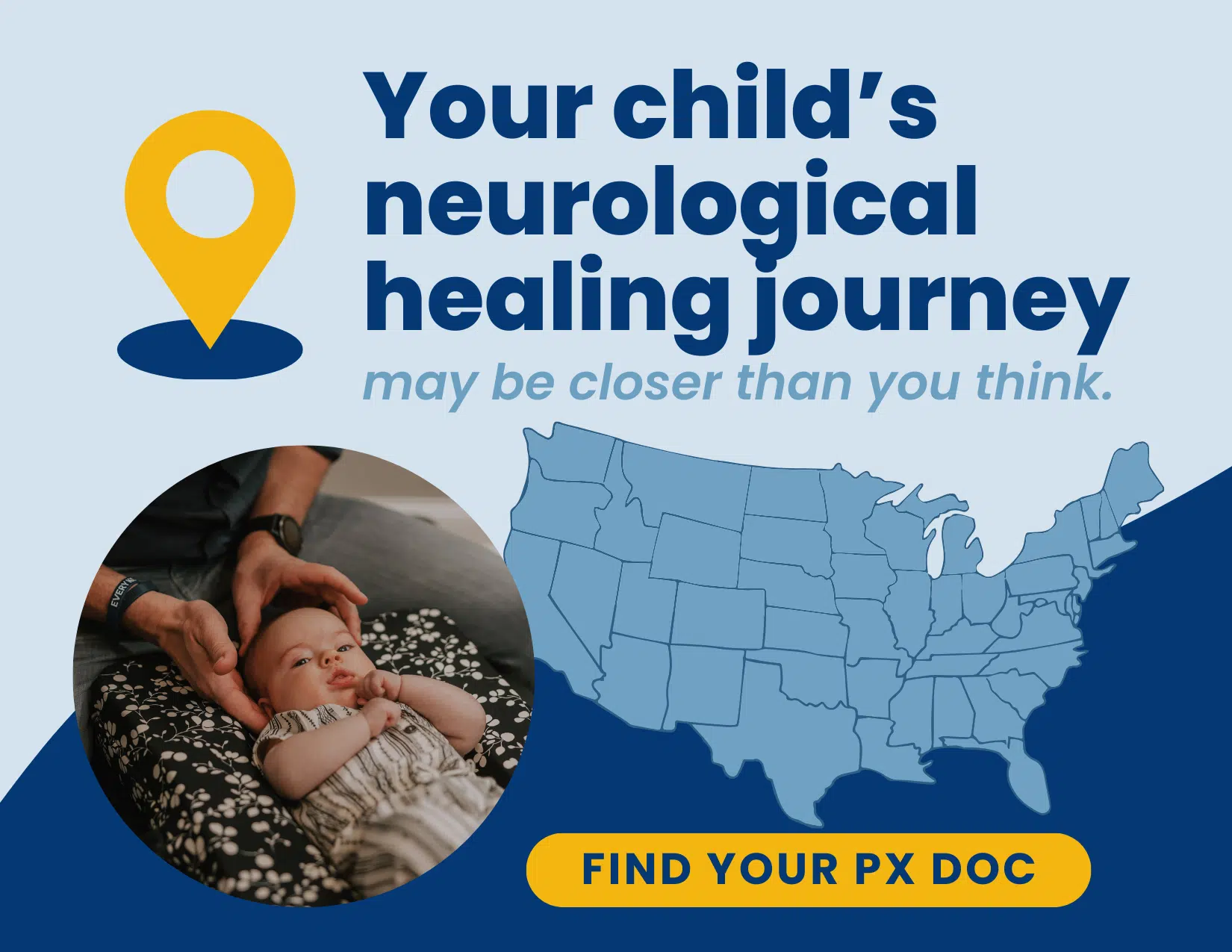As a parent, you naturally want your child to be healthy, happy, and thriving. However, you may notice that your child struggles with emotional regulation, has difficulty focusing, or experiences unexplained physical issues. What you may not realize, however, is that these issues could be due to a dysregulated nervous system.
A well-regulated nervous system is important for a child’s development and overall health. However, if it becomes dysregulated, it can lead to various issues impacting their quality of life.
Nervous system dysregulation is more common than you might think. Studies have shown that up to 1 in 6 children may experience challenges from having a dysregulated nervous system, such as anxiety, depression, attention deficits, and sensory processing issues. Yet, many parents are unaware of the nervous system’s impact on their child’s health and well-being.
In this article, we’ll examine how the nervous system works and related signs of a dysregulated nervous system. We’ll also examine the life-changing potential of Neurologically Focused Chiropractic Care in addressing the root causes of this hidden struggle.
The Nervous System: A Vital Component of Health
To understand how a nervous system can become dysregulated, we must first understand how it works. The nervous system is divided into two main components: the central nervous system (brain and spinal cord) and the peripheral nervous system (sensory neurons, ganglia, and nerves throughout the body).
The autonomic nervous system plays a crucial role in maintaining balance and regulation within the peripheral nervous system. This system is further divided into two branches:
- The sympathetic nervous system: Often referred to as the “fight or flight” response, prepares the body to react to stressful or dangerous situations by increasing heart rate, blood pressure, and breathing rate.
- The parasympathetic nervous system: Known as the “rest and digest” response, helps the body relax, conserve energy, and perform essential functions like digestion and sleep.
The delicate balance between these two branches is essential for optimal health and well-being. When one system dominates the other, it can lead to a wide range of physical and emotional effects.
The Role of the Vagus Nerve
One of the most important nerves in the autonomic nervous system is the vagus nerve. It is the longest cranial nerve in the body, extending from the brainstem to the abdomen and connecting the brain to vital organs like the heart, lungs, and digestive tract.
The vagus nerve regulates key functions such as heart rate, breathing, and digestion, making it a critical player in a well-functioning nervous system.
Recognizing the Signs of a Dysregulated Nervous System
A regulated nervous system allows children to learn, play, and interact with the world around them while managing stress and maintaining emotional balance. However, when the nervous system becomes dysregulated, it can have far-reaching consequences for a child’s physical, emotional, and cognitive health.
As a parent, you should be aware of the signs of a dysregulated nervous system to seek appropriate help and support for your child.
Physical signs of a dysregulated nervous system may include:
- Chronic tension in the muscles and joints
- Digestive issues such as constipation, diarrhea, or stomach pain
- Sleep disturbances, including difficulty falling or staying asleep
- Frequent headaches or pain in the neck and back
Emotional signs can be just as challenging and may include:
- Mood swings and emotional outbursts
- Anxiety and fearfulness
- Depression and feelings of hopelessness
- Irritability and difficulty regulating emotions
Cognitive traits of a dysregulated nervous system can impact a child’s ability to learn and thrive in school. These may include:
- Persistent worry and difficulty letting go of fears
- Chronic stress and feelings of being overwhelmed
- Poor memory and difficulty retaining information
- Difficulty concentrating and focusing on tasks
It’s important to note that these issues may not always be present simultaneously, and their severity can vary from child to child. Some children may experience a combination of physical, emotional, and cognitive concerns, while others may only struggle in one area.
“The Perfect Storm” of Causes of a Dysregulated Nervous System
Nervous system dysregulation often begins early in life and progresses over time due to a combination of factors. We refer to this combination of factors as “The Perfect Storm.”
Environmental toxins and genetic predispositions may disrupt healthy nervous system regulation. However, stressful pregnancies and birth trauma are well-documented as among the most significant contributors to nervous system dysregulation. As these stressors combine and accumulate, they can overwhelm a child’s developing nervous system, leading to dysregulation and a wide range of problems.
The Long-Term Consequences of Nervous System Dysregulation
When a child’s nervous system is stuck in a state of dysregulation, the effects can be far-reaching and profound. Beyond the immediate issues, nervous system dysfunction can have many consequences on a child’s physical health, emotional well-being, cognitive development, and overall quality of life.
Physical Health Consequences
Chronic nervous system dysregulation can take a toll on a child’s physical health, contributing to a wide range of issues and even chronic diseases, such as:
- Chronic Pain Syndromes: This can include issues such as fibromyalgia or headaches
- Digestive Disorders: This can include Irritable Bowel Syndrome (IBS) and reflux
- Immune Dysfunction: This may cause frequent illnesses and autoimmune conditions
- Cardiovascular Problems: Problems such as high blood pressure and irregular heartbeat can develop
Emotional Health Consequences
A dysregulated nervous system can have a significant impact on a child’s emotional well-being, increasing the risk of:
- Anxiety Disorders, such as Generalized Anxiety Disorder (GAD) or panic disorder
- Depression and mood disorders
- Obsessive-Compulsive Disorder (OCD)
- Post-Traumatic Stress Disorder (PTSD)
Cognitive Development and Learning Consequences
Nervous system dysregulation can also interfere with a child’s cognitive development and learning ability. Children with a dysregulated nervous system may experience:
- Attention deficits and hyperactivity
- Learning disabilities and academic struggles
- Behavioral issues and difficulties with impulse control
- Social challenges and trouble reading social cues
The Limitations of Traditional Approaches to Nervous System Dysregulation
When faced with a child struggling with the signs of a dysregulated nervous system, many parents turn to conventional medical interventions for help. While these approaches can provide some relief, they often fall short of addressing the root causes of the problem and promoting long-term healing.
Symptom Management
One of the primary limitations of traditional approaches is their focus on merely symptom management. Conventional medical interventions, such as prescription medications, often aim to suppress or mask the signs of nervous system dysregulation rather than addressing the underlying imbalances.
Risk of Negative Side Effects
Another limitation of traditional medical approaches is the risk of negative side effects and long-term consequences. Many medications to treat signs of nervous system dysregulation can adversely affect a child’s developing brain and body.
Isolated Care
Finally, many traditional approaches lack a holistic, whole-child perspective. Conventional medical interventions often treat the child’s issues in isolation without considering the complex interplay between the nervous system, immune system, digestive system, and other bodily functions.
As parents become increasingly aware of traditional approaches’ limitations, many seek alternative solutions that address the root causes of their child’s problems and promote whole-child healing.
Neurologically-Focused Chiropractic Care: A Breakthrough Solution
Neurologically-Focused Chiropractic Care offers a groundbreaking approach to restoring balance and promoting optimal health for children struggling with the consequences of a dysregulated nervous system. This specialized form of chiropractic care targets the root causes of nervous system dysfunction, addressing subluxation, dysautonomia, and vagus nerve dysfunction through drug-free, non-invasive techniques.
At the heart of Neurologically-Focused Chiropractic Care is the understanding that misalignments and tension in the nervous system can interfere with proper nervous system function. These misalignments, known as subluxations, can disrupt the delicate balance between the sympathetic and parasympathetic nervous systems, leading to dysautonomia and a wide range of physical, emotional, and cognitive concerns.
One critical component of Neurologically-Focused Chiropractic Care is using Neurological INSiGHT Scans. These revolutionary scans allow chiropractors to identify specific subluxation patterns and areas of nervous system dysfunction with unparalleled precision.
The Benefits of Neurologically-Focused Chiropractic Care for Children with a Dysregulated Nervous System
As children receive regular neurologically-focused chiropractic care, the data suggests they will experience a wide range of benefits supporting their overall physical and mental health. Some of the most common improvements reported by parents and children include:
- Improved sleep quality and reduced fatigue
- Enhanced emotional regulation and reduced anxiety or depression
- Better focus, concentration, and cognitive performance
- Increased resilience to stress and improved overall well-being
In addition to these benefits, many children experience improved physical health, such as fewer digestive issues, reduced pain and tension, and a stronger immune system.
Addressing Your Child’s Dysregulated Nervous System with PX Docs
If you suspect that your child has signs of a dysregulated nervous system, the first step toward healing is to schedule an appointment with a qualified PX Doc. Our pediatric chiropractors specialize in Neurologically-Focused Chiropractic Care and have extensive training in identifying the root causes of nervous system dysfunction.
Addressing the signs of a dysregulated nervous system through a holistic, neurologically-focused approach is the most effective way to address the issues at their root cause. Even if alternative medical approaches have provided short-term relief in the past, Neurologically-Focused Chiropractic Care provides a care plan aimed at long-term results.
If you are looking for a drug-free pediatric provider near you, visit the PX Docs Directory to find the closest one.





